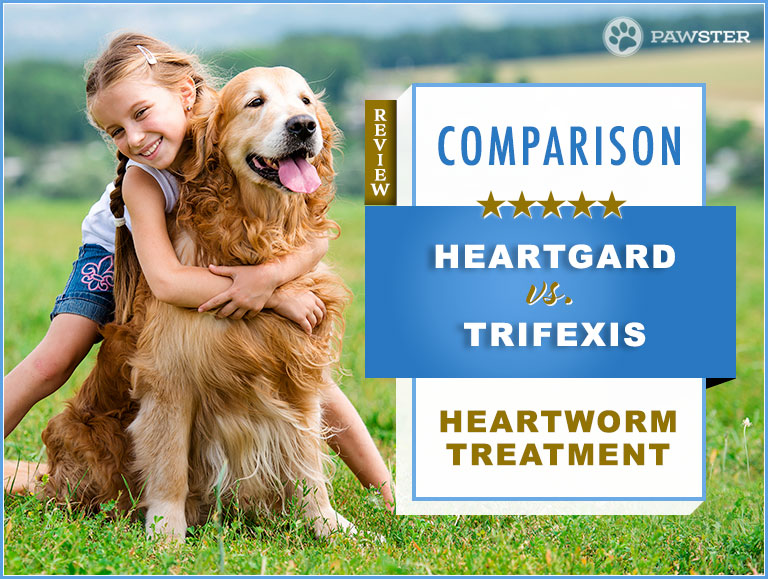Heartgard vs. Trifexis : Comparison and Key Differences

Contents of Article
- Which is Better Heartgard or Trifexis for Dogs?
- Which is Better Heartgard or Trifexis for Cats?
- Our Review of Heartgard and Trifexis
- Key Differences Between Heartgard and Trifexis
- Heartgard and Trifexis Active Ingredients Comparison
- Which Treatment is the Best Priced?
- Which Do We Recommend?
- 7 Treatment Application Tips
- Final Thoughts
Heartworms are a parasitic worm that infests the organs of dogs and cats. Heartworms are easily contracted, detrimental to the wellbeing of your pet and potentially fatal.
The good news is; it’s easy to protect your pet from heartworm with regular doses of preventative heartworm medication.
Which is Better Heartgard or Trifexis for Dogs?
The Trifexis brand carries a lot of weight with the veterinary community for its broad-spectrum parasitic protection, which includes heartworms, hookworms, roundworms whipworms, and fleas.
We love the added protection from fleas because flea treatments for dogs are often sold separate form heartworm treatments.
Furthermore, side effects are rarely associated with Trifexis. Heartgard, on the other hand, does not include protection from fleas and is commonly associated with side effects, especially depression, lethargy, vomiting, and diarrhea.
Therefore, we recommend Trifexis over Heartgard for dogs.
Which is Better Heartgard or Trifexis for Cats?
It is rare for felines to contract heartworms. Feline physiology cannot support the adult heartworm.
When cats do contract heartworm, they are never infested with more than three adolescent worms cannot mature to adulthood.
For these reasons, a vet may recommend monitoring your cat through the short lifespan of the worms, in lieu of treatment.
However, the rarity of feline heartworms is no reason not to inoculate your cat from heartworm and other types of parasitic worms.
Adulticide therapy for cats does not exist. Therefore, severe cases of feline heartworm disease often call for a surgical procedure to extract the worms.
Surgery is highly invasive, traumatizing and not always successful. The only way to truly free your cat from the ravages of heartworm disease is to prevent them from ever contracting it.
We recommend Heartgard because Trifexis is not approved for feline application.
Our Review of Heartgard and Trifexis
Heartgard and Trifexis are heavy-hitters in the world of pet meds. Each has a stellar reputation with vets and pet owners alike.
Trifexis
Trifexis is a top-selling parasitic treatment for dogs with more than 50-million doses sold. Trifexis comes in a convenient chewable beef-flavored tablet.
When delivered monthly, Trifexis provides peace-of-mind and wide spectrum protection from parasitic infestation.
Each tablet kills fleas and prevents infestation from heartworms, hookworms, roundworms whipworms and flea reinfestation.
Heartgard
Heartgard Plus is a parasitic preventative designed to kill heartworms, roundworms & hookworms.
Heartgard is designed to kill parasitic-worm larvae before they mature. Adolescent parasitic worms cannot reproduce and die off in a short time.
When administered monthly, Heartgard beef-flavored chewable tablets provide solid protection from parasites and promotes a healthy immune system.
Also Read: Nexgard vs. Advantix
Key Differences Between Heartgard and Trifexis
Heartgard and Trifexis are designed to do the same thing and come equally recommended by veterinarians.
However, they differ in key aspects that determine their effectiveness and whether you should choose one, over the other for your pet.
Protection
Wide-spectrum parasitic protection is key to the wellbeing of your pet.
Though Heartgard and Trifexis include protection from heartworms, roundworms, and hookworms, only Trifexis includes additional protection from whipworms and fleas.
Trifexis offers greater protection from parasites than Heartgard, but also better value.
Fleas are external parasites. Heartworms, roundworms, hookworms, and whipworms are parasitic worms, which are internal parasites.
Internal and external parasites are treated differently and with different active ingredients. As a result, flea and worm protection are often different and sold independently.
Trifexis combines internal and external parasite protection which eliminates the need to buy two separate treatments to protect your pet from parasites.
Availability
Each Heartgard and Trifexis package is differentiated by color and contains six treatments.
Each color indicates the dosage level of the tablets and the corresponding body weight of the intended pet.
Heartgard Plus is available in three doses, including Heartgard Chewable Tablets for Cats, up to 15 lbs.
- Blue Box – Heartgard Plus Chewable Tablets for Dogs, up to 25 lbs
- Green Box – Heartgard Plus Chewable Tablets for Dogs, 26-50 lbs
- Brown Box – Heartgard Plus Chewable Tablets for Dogs, 51-100 lbs
Trifexis comes in three different dosage levels but lacks any application for cats.
- Purple Box – Trifexis Chewable Tablets for Dogs, 5-10 lbs
- Orange Box – Trifexis Chewable Tablets for Dogs, 10.1-20 lbs
- Green Box –Trifexis Chewable Tablets for Dogs, 20.1-40 lbs
- Blue Box – Trifexis Chewable Tablets for Dogs, 40.1-60 lbs
- Brown Box – Trifexis Chewable Tablets for Dogs, 60.1-120 lbs
Reputation
The issue of brand reputation is where our comparison gets interesting. More than 50-million doses of Trifexis have been sold worldwide.
However, in recent years some pet owners have claimed that the Trifexis treatment made their dogs sick. Some customers were even bold enough to blame the death of their dog on the Trifexis treatment.
The resulting media storm forced the FDA to firmly state, “…no link has been established between the drug [Trifexis] and any dog deaths.”
Veterinarians have stood by the Trifexis treatment and continue to recommend it as their primary preventive treatment for heartworms, roundworms, hookworms, whipworms, and fleas.
Heartgard and Trifexis Active Ingredients Comparison
Trifexis and Heartgard are designed to accomplish the same task; defend your dog from heartworms. However, the active ingredients they use to accomplish that task are very different.
The active ingredient of preventative heartworm treatments determines not only the effectiveness of the treatment but also dosage level, treatment longevity, application and possible side effects of the treatment.
Heartgard: Ivermectin & Pyrantel
Heartgard defends your dog from heartworms with a combination of ivermectin and pyrantel.
Ivermectin is an antiparasitic commonly used against parasitic worms. Ivermectin increases cell membrane permeability which paralyzes and kills parasitic worms.
Pyrantel is available as a generic medication designed to treat parasitic worm infections.
Trifexis: Milbemycin Oxime & Spinosad
Milbemycin oxime is a broad spectrum antiparasitic effective against worms and mites.
Spinosad is used to control a wide variety of insects, including fleas. Spinosad is absorbed into your pet’s bloodstream. Infesting fleas then consume your pets spinosad-laden blood and die.
Which Treatment is the Best Priced?
Heartgard is the more affordable heartworm treatment when compared to Trifexis.
On average, Trifexis products are priced between $75 – $10. Whereas Heartgard averages between $22 – $38.
Which Do We Recommend?
We recommend Trifexis, for a simple but powerful reason. Trifexis provides more protection from parasites than Heartgard.
In addition to protection from heartworms, hookworms, roundworms, and whipworms, Trifexis protects your dog from fleas, saving the cost of secondary flea treatment.
Trifexis also includes a better reputation amongst veterinarians who appreciate the treatments broad-spectrum parasitic protection.
When compared to Heartgard, Trifexis is the more expensive heartworm treatment option. We are yet to meet a pet owner who isn’t willing to invest in additional protection from fleas and whipworms for the pets.
Dogs are the natural host to heartworms. So, they are the subject of most of the concern regarding heartworm infection.
However, it is important to remember that felines are vulnerable to infection as well. Trifexis is not approved for use in cats.
For this reason, we must add a caveat to our official recommendation and suggest Heartgard for feline heartworm prevention.
7 Treatment Application Tips
It can be very difficult to convince/ trick your pet into ingesting their heartworm treatment. Here are seven tips to make heartworm treatment application a little easier.
For Dogs:
- It’s common for dogs to refuse Heartgard and Trifexis tablets. Try concealing the treatment in a piece of deli meat or a treat.
Give your dog a treat, or a piece of meat that does not contain any treatment. Once they have ingested the first treat, try again with the treat containing the tablet.
- It’s very difficult to administer a Heartgard treatment to hyper dogs. We recommend taking your hyper dog for a long walk or a session of vigorous playtime to tire them out.
Exhausted dogs are more likely to consume their food without noticing the flea treatment.
- Diarrhea and vomiting are common side effects of Heartgard and Trifexis. We recommend monitoring your dog after administering either treatment to ensure they do not regurgitate the dose.
If your dog vomits up the treatment, we recommend waiting a short time before re-administering treatment.
For Cats:
- The easiest way to administer a chewable treatment to a cat is to conceal it in pill pockets, or pill paste. Each enables you to hide the pill in a way that is tastier and less obvious to your kitty.
Otherwise, we recommend hiding the tablet in their food and hoping they don’t notice. But cats are observant by nature and often eat around the treatment.
- Cats are more likely to ingest all of their food, including the concealed treatment if they can’t see you watching them eat.
- If your cat won’t eat the treatment, it’s time to administer the treatment orally. Gather up your cat in the towel and use your hands or a to administer the treatment orally. Chase the treatment with the syringe of water.
- The most important tip to remember when administering any medication to your cat is to remain calm. Cats know when you are nervous, which makes them nervous and more likely to refuse treatment.
Final Thoughts
We always recommend consulting your vet before starting a heartworm treatment. However, when it comes to Trifexis, you can feel safe you made the right choice for your pet.
Trifexis is thoroughly tested and proven to work when administered on a monthly basis. We love it because it provides wide-spectrum parasitic defense against roundworms, hookworms, tapeworms, whipworms, heartworm, and even fleas.
Your pet’s comfort and well-being depend on remaining free of heartworm infestation. Heartworms degrade your pets’ immune system and endanger your pet’s life.
It’s easy for your dog to contract heartworm. Mosquitos carry the worm, and a simple bite by an infected mosquito is enough for your dog to contract heartworm.
Buying the right heartworm treatment is the first step to protecting your pet.
Heartgard chewable tablets are cheap, effective and available over the counter. Trifexis includes a wider spectrum of protection, lasts longer than Heartgard, and is recommended by vets everywhere.
Have you tried Heartgard or Trifexis on your pet? Do you disagree with our recommendation? Maybe you have a pet treatment tip that you would like to share. Let us know in the comments below.






